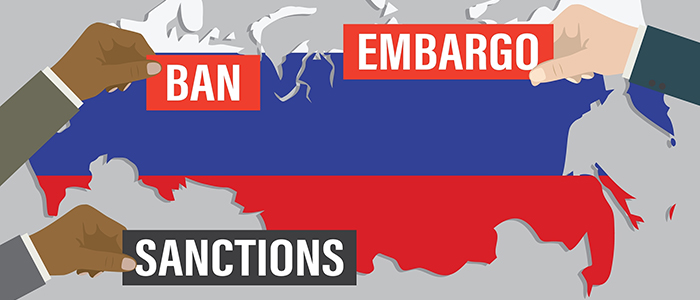The Economist: sanctions on Russia don't work
When Putin decided to invade Ukraine in late February, the Western bloc had no doubts that economic sanctions against Moscow were one of the main tools to counter Russian hegemonic aims by weakening the national economy.
The Russian economy is doing well despite the sanctions
The Economist writes in what appears to be a suggestion to hit Moscow harder. The ineffectiveness of the sanctions imposed by the West after the invasion of Ukraine are certified by the figures. A long analysis by the British weekly shows that there has been no rapid collapse of Russian economic activity, as hoped for.
According to the British weekly, the real Russian economy "has proved surprisingly resilient". Although consumer prices have jumped by more than 10% since the beginning of the year due to the depreciation of the ruble, which has made imports more expensive, and the 'flight' of many Western companies, which reduced supply, electricity consumption fell only slightly. And, according to the numbers provided by Sberbank, after a first shock in March, the Russians have quietly returned to spend in cafes, bars and restaurants.
https://twitter.com/TheEconomist/status/1524615510964543489
One of the reasons analyzed by the newspaper, which can explain why Russia is managing to react to the sanctions, lies in the fact that, after all, Moscow was a closed economy even before the outbreak of the conflict. Dependence on the West was less strong than what some analysts have proclaimed in recent months, and it has been underestimated too much how much fossil fuel deposits represent for Moscow an enormous guarantee of solidity. Paradoxically, the one who is being damaged by these sanctions is the European continent. The eurozone is particularly suffering from the measures taken against Russia.
Meanwhile, according to The Economist, Russia has exported oil and gas worth at least $ 65 billion, with government revenues from hydrocarbons rising more than 80 percent year-on-year in the first quarter of 2022.
The Institute of international finance estimates that the current surplus could reach 250 billion dollars, 15% of GDP, more than double the 120 billion dollars recorded in 2021. This is due to the fact that, as announced several times, countries like India and China (they account for half of the world population) have maintained stable relations with Moscow.
The ruble is now as valuable as before the war, says The Economist, due to "capital controls and high interest rates". As of Friday, the Russian currency was actually stronger: 65.8 against the US dollar, up from 81 on February 23. Russia also continues to pay its foreign currency bonds, despite attempts by the US and UK to force it into a default.
References:
https://www.economist.com/finance-and-economics/2022/05/07/russias-economy-is-back-on-its-feet
